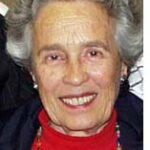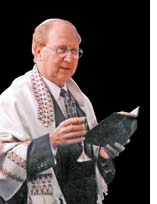Click here to hear the late Cantor Sheldon Merel and the Beth Israel Choir sing “Avinu Malkenu.”
By Eileen Wingard


LA JOLLA, California — The final program of this season’s Treasures from the Music Collection of the Astor Judaica Library will feature the beloved voice of Cantor Sheldon Merel. It is the last of a three-part series which included the voices of Theodore Bikel and Debbie Friedman. “The Beloved Voice of Cantor Sheldon Merel,” a free program, will take place at 2 p.m., Thursday, June 6 in the Astor Judaica Library of the Lawrence Family JCC. To register, click here.
I will be hosting the event and assisting me as my special guest will be Rabbi/Cantor Jeremy Gimbel. He just received his ordination as a cantor last Monday from the Academy of Jewish Religion, a non-denominational institution in Los Angeles, and will be succeeding Rabbi/Cantor Arlene Bernstein as Cantor of Congregation Beth Israel. She was the successor to Cantor Sheldon Merel.
Cantor Merel served the congregation from 1979 to 1991 and continued to participate in high holiday services with his majestic voice until shortly before his death on July 10, 2022.
The 13 selections on the playlist for the program were chosen from Merel’s two CDs, Standing Ovation and Chants of a Lifetime. The CDs were compiled from live performances and illustrate the many facets of Merel’s artistry. Merel’s glorious voice was often compared to the virtuoso cantors of the early 1900s. One of their favorites was in Yiddish, “Kaddish of Rabbi Yitzhok,” which will open the program.
Hebrew liturgical works by 20th century composers will include, “Hashkiveynu,” and “Avinu Malkenu,” by Max Janowski, “La Kol Z’man,” and “Shalom Rav,” by Ben Steinberg, “Kiddush,” by Kurt Weill, “L’Shana Haba B’Yerushalayim,” by Morton Gold and a setting of the “Kol Nidre,” by Max Helfman.
The program will also include the Ladino folksong, “Los Bibilicos (The Nightingales),” and Julius Chayes’ setting of “Adarim,” a pastoral song from pre-state Israel. Displaying his operatic skill, he will be heard singing “Rachel Quand Du Seigneur,” the famous aria from the French opera, La Juive (The Jewess) by Fromental Halevy.
Two selections in English from Broadway musicals will be “Meeskite,” from Cabaret by Fred Ebb and “Maria,” from Westside Story by Leonard Bernstein.
Sheldon Foster Merel was born in 1924 in Chicago, Illinois to parents whose families had immigrated from Eastern Europe and England. He probably inherited his artistic talent from his father, Paul, who earned his living as an airbrush artist, played harmonica and mandolin and had a pleasant singing voice. He inherited his outgoing personality from his spirited, fun-loving mother, Frieda, who was a leader in her Hadassah chapter.
When Merel was nine years old, his family moved to New York, where he and his older brother, Maynard, had meaningful Jewish experiences at the 92nd St. Young Men’s Hebrew Association (YMHA). Sheldon s first singing engagement was in a YMHA show.
After graduating high school in 1941, he entered the College of the City of New York (CCNY), majoring in engineering. With the entry of the US into World War II, Merel enlisted for an 18-month course in the State Maritime Academy and graduated as a licensed third engineer in the United States Maritime Service, sailing Liberty Ships in the North Atlantic, Mediterranean and Caribbean oceans.
After the war, Sheldon returned to CCNY and transferred to the Business College. He supported himself by working as a night relief engineer officer on merchant ships in New York Harbor. At age 21, he decided to take voice lessons. He sang at shows at CCNY and soon got a job singing at a resort hotel in the Catskilll Mountains (the Borscht Belt), where he worked several summers as a singing master of ceremonies.
After graduating with a Bachelor of Business Administration degree, Sheldon and Maynard opened a recording studio. Sheldon sang on demo recordings. One of their clients was Cantor Gershon Ephros, a faculty member of the new School of Sacred Music at the Hebrew Union College, the Reform Movement’s rabbinical seminary. When Ephros heard Sheldon’s voice on a demo recording, he encouraged the young man to apply to the School of Sacred Music. That changed the direction of Merel’s life. He entered the school in 1949. Next year, he attended the Brandeis Camp Institute to study with the great Jewish choral conductor and composer, Max Helfman. Merel also received a scholarship to study and perform opera under Boris Goldofsky, director of the Boston Opera.
After his 1952 graduation from the School of Sacred Music as a cantor-educator, he and his bride, Marcie, went to Temple Beth El in South Bend, Indiana, where he served as cantor and youth director. During those four years, their sons Joshua and Daniel were born. Next, the family moved to Chicago, where Merel served a larger congregation as cantor, educator and youth director. In 1956, Temple Sinai in Oakland, California, invited Merel to be their cantor-educator. While there, he performed with Edward G. Robinson at the San Francisco Opera house and became a member of The Talent Bank of the San Francisco Opera Guild. In Oakland, daughter, Judith, was born.
In 1969, Holy Blossom Temple in Toronto, Ontario, invited Merel to be its cantor and music director, a post he held with great esteem for a decade. At the age of 55, he and
his family returned to the warmth of California, where he was asked to become the cantor of Congregation Beth Israel in San Diego.
Here, he established an annual Composer-in-Residence series and brought leading Jewish composers to lecture and conduct their music. He did collaborative programs with Conductor David Amos and the Jewish Community Symphony Orchestra (now TICO), presenting an annual Orchestral Shabbat with guest church choirs. Performances took place in the temple on Friday evening and in the choir’s church on Sunday.
During his 12 years with Congregation Beth Israel, he presented over 36 special musical events in the temple and in the community. He retired in 1991 and was officially titled Cantor Emeritus. In 1998, he was awarded an Honorary Doctor of Music degree from Hebrew Union College School of Sacred Music and over 150 members of the congregation contributed $25,000 to establish a cantorial scholarship fund bearing his name at that school. For over 69 years, Sheldon Merel was an active member of the American Conference of Cantors. His final years were spent at Seacrest Village in Encinitas, where he continued to participate in programs and religious services. Cantor Sheldon Merel was 97 years old when he died.
The words of the great Rabbi Gunther W. Plaut, who served as Rabbi of Holy Blossom Temple during Cantor Merel’s tenure, eloquently described this musical emissary of our people, “Sweet of voice and personality, devoted to his task, innovative and daring….. beloved and respected.”
Eileen Wingard is a freelance writer specializing in coverage of the arts.
Great overview of the life and accomplishments of such a special person. Thank you.
What a moving tribute to this monumental figure whose voice and humanity brought light to so many communities throughout his lifetime. Thank you for honoring and writing so eloquently about The Beloved Voice of Cantor Sheldon Merel.